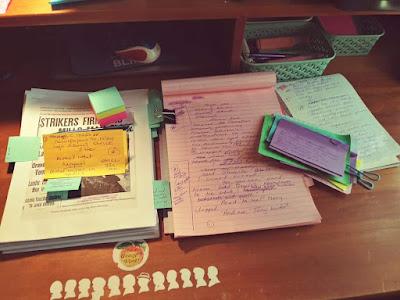It's Possible
It was bound to happen. My old computer burned out. (Translation: I wore it out.)
Got a new computer, and Personal Computer Wizard set it up.
I started working on my draft. (Translation: 180 pages of revisions.)
Except new computer has all these buttons. Newfangled
whatsit buttons with squiggles and wiggles and loopy designs. But I’m trying to
finish this revision. I’m happily
working along with these revisions, scene shifts, chapter realignments, line-edits,
thinking I’m ahead of the game. (Foreshadow: You just know what’s
coming.)
Yep. I forgot to push a squiggle to save. I lost 80 pages of
line edits. The situation is all the more dire because I tend to handwrite
everything. Notes on scene changes, contexts, line-edits. And I had already
thrown away my handwritten notes and previous printouts.
Yep. Loudest beslubbering hell-hated rude-growing PoopIt
ever!
So, I dug my notes out of the stinky garbage, except apparently the garbage pick-up is more efficient than I am. Most of my notes had already gone to trash haven. So. What. Do. I. Do. Now.
Where do I begin?
The topic for this round of blogposts is Looking for
Motivation. Every writer without exception, no matter where they are in their
careers, faces those days when their motivation wanes. In looking for
inspiration, it becomes easy for a writer to lose themselves in the thousands
of books and articles that offers writerly advice.
Nick DiLallo offers an interesting take in his article, The Best Writing Advice I Ever Ignored, in which he “devoured and internalized every piece of writing advice available. Every tip, trick, tidbit, factoid, and helpful hint. Every “do” and every “don’t…None of it has made me a better writer.” Do whatever works for you, he concludes.
Hannah Mary McKinnon, at Curtis Brown, highlights TenAuthors Share Their Best Writing Advice offers that, “Most authors will tell you; writing is hard. It’s a solitary
occupation, often filled with self-doubt and trepidation. Hours are spent
drafting, editing and polishing before feedback arrives and you start all over
again.” She wondered what tips her author friends – including Samantha M.
Bailey, author of Woman on the Edge; Kimberly Belle, author
of The Marriage Lie, Dear Wife and Stranger in the Lake;
and, Laurie Petrou, author
of Sister or Mine and Love, Heather, among others—might offer.
It turns out, there’s no one-size-fits-all strategy.
Tim Denning at Writing Cooperative offers “The Best WritingAdvice I’ve Ever Been Given” from one of the most underrated writers in the
world.” As he states, “Good writing advice is hard to
find. Most writing advice I read doesn’t help me write better. The writing tips
are turds clogging up my brain. I desperately want to write better. My grammar
skills need work. I need to expand my vocabulary. I need to get better at
getting to the point.” His ultimate discovery: “Simplicity does a lot more for
a reader’s brain than writers care to admit. Simplicity drains less of a
reader’s energy.” In other words, keep it simple.
Perhaps the very best writing advice I’ve read comes from
Shaunta Grimes article, “The Best Writing Advice Ever.” She remembers that as “an 11-year-old sixth grader sitting in the auditorium…I
was just one little girl in a sea of thousands over the decades.” The speaker
that day was the indomitable Tomie dePaola. “He advised me that regular people
write books” she states. “The best writing advice I’ve ever had was just that
it’s possible.”
It's possible.
Like getting back to this revision.
-- Bobbi Miller

It's possible! Also, I lost nearly an entire short story once when it didn't save right. I made myself sit right back down and hammer it out. I knew if I waited, I'd have less of a chance of remembering it right. I was so glad I did. I went to bed VERY late and VERY happy to have it all down.
ReplyDelete